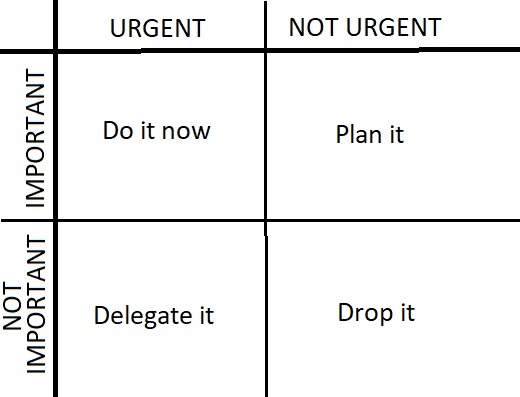God’s Word for You
Psalm 101:1-2 The Eisenhower Box
by Pastor Timothy Smith on Thursday, April 22, 2021
For our meditation on this Psalm, we will read the Evangelical Heritage Version (EHV) as our translation.
The Good Ruler
By David. A psalm.
David writes “A psalm of David” in many of his Psalms, but seven times he reverses the order: “By David, A Psalm.” (Psalms 24, 40, 68, 101, 109, 110, and 139). A little study of these, and a question, “Why emphasize David’s authorship first?” might yield a nice discussion at home or in a small group. In this case, I think that David is especially holding himself to account as king of Israel, since the psalm is about what makes a good king.
1 I will sing about your mercy and justice.
To you, O LORD, I will make music.
2 I will act wisely, following the way that is honest.
This part of verse 2 could also be translated, “I will meditate on [your] blameless way.” Each of these three lines has a musical term: “sing,” “make music,” and “act wisely” which could also be “sing a maskil,” which is a type of psalm (see Psalm 142:1). It’s possible that a master poet such as David had all of these subtle things in mind, weaving them expertly together and allowing the performance or recitation of the psalm to reveal them in different ways with each reading. These lines proclaim the greatness and perfection of God, his mercy, his justice, and his blameless honesty. The human ruler wants to proclaim this for himself and his people in his words (“I will sing / make music”) and in his actions (“I will act wisely / following the way”).
When will you come to me?
Within my palace I will conduct myself with integrity. (EHV)
Now David turns from God’s pure ideal to himself, the impure, less-than-ideal king. His desire is to behave in a godly manner, to conduct himself with integrity, but how can anyone truly do what is right? A man can behave all day long in a way that seems right, and yet in his heart he knows that his thoughts are impure, his motives are never perfect, and his own desires do not match up with God’s will. The loneliness of a man in charge comes shooting from David’s lips like a cannon going off: “When will you come to me?” For someone who is guided by a parent, a boss, or an official of some kind, there is the security or even the smugness of knowing that someone else is responsible; someone else is to blame. But what about when I am the one who’s in charge? What am I to do when I bear all of the responsibility, when people to my right and my left criticize and second-guess me at every turn? They don’t bear the burden in the slightest, but they’re quick to say things like “You should do this, or that.” When Dwight D. Eisenhower had to make the hard decisions as General and later as President, he created a system that is still useful to countless people to this day. He divided decision making four ways: urgent, not urgent, important, and not important. Then he placed these titles in a box of two rows, and labeled them ‘Do it,’ ‘Plan it,’ ‘Delegate it,’ or ‘Drop it’:

A parent might find that a lot of the things they do fall into the “Delegate it” box, or even in the “Drop it” box. So might a king. There can be some benefit in talking things over with a peer, but David had no peers as king of Israel. There were no other godly kings in the world. Sometimes a parent can feel the same way, depending on where they live.
So we turn to God. Even if we have peers to share the burden, God is the one who is truly there, who rolls out a plan for us to follow in his word. The prophet Micah spelled it out in clear, simple words: “What does the Lord require of you? To act justly and to love mercy and walk humbly with your God” (Micah 6:8). And if we wonder who will back us up when we exercise our authority, Micah says: “Listen! The Lord is calling to the city—and to fear your name is wisdom—‘Heed the rod and the one who appointed it’” (Micah 6:9). If stern words are required, say them. If a gentle hand is needed, offer it. If bold action is required, take it.
David has more to say, especially about those who serve a leader. But for now, for those who lead, it is time to call out to the Lord for help. And keep these words close to your heart: “It is the LORD God who helps me. Who can condemn me? They will wear out like a garment” (Isaiah 50:9). The Lord is with you. Always.
In Christ,
Pastor Timothy Smith





